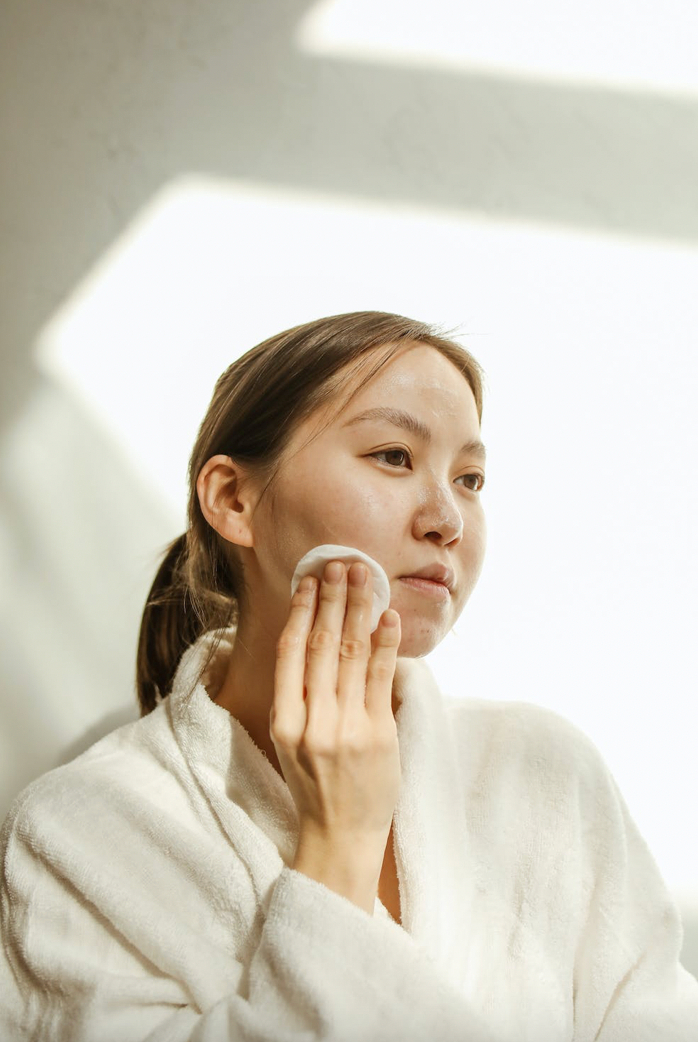Antioxidants and free radicals are among the biggest buzz words in the world of beauty, but beyond the marketing jargon, what are antioxidants and free radicals and how do they factor into both skin health and skincare? Allow us to break it down for you.
What Are Free Radicals?
Free radicals are essentially molecules with unpaired electrons. Because free radicals are unstable, they steal electrons from other cells, damaging them in the process. Free radicals are formed naturally in the body and play an important role in many normal cellular processes, but at high concentrations free radicals can cause damage to all the major components of our cells, including lipids, proteins, and cell membranes.
What is Oxidative Stress?
An overload of free radicals can result in what is known as free radical damage or oxidative stress. In skin, oxidative stress can impair its function in a number of ways including inhibiting collagen and elastin production, triggering dark spots and other discoloration, reducing barrier function, increasing sensitivity, and decreasing moisture. Free radicals and the damage they cause therefore play a major role in the aging process.
Photo by Nadi Lindsay from Pexels: https://www.pexels.com/photo/busy-repairing-street-with-cars-and-steam-from-pipe-5320290/
What Are Antioxidants?
Antioxidants, also known as free radical scavengers, are chemicals that interact with and neutralize free radicals, preventing them from causing damage. While our bodies naturally produce antioxidants (known as endogenous antioxidants), it relies on external (exogenous) sources to obtain the rest of the antioxidants it needs. External sources of antioxidants include dietary sources such as fruits, vegetables, and grains and topical active ingredients, both of which work to neutralize free radicals.
How to Prevent Free Radical Damage?
In a perfect world, our body is able to maintain a balance–or homeostasis– between free radicals and antioxidants. Exposure to sun, smoke, and even stress however can throw this balance off and leave us unable to keep free radicals in check. Antioxidants can prevent oxidative stress by neutralizing free radicals, either breaking them down or interrupting the chain reactions that they cause. Maintaining a balance between free radicals and antioxidants is therefore crucial to proper cell function, skin health, and fending off oxidative stress.
In addition to a healthy diet, lowering exposure to environmental pollutants with oxidizing properties and wearing sunscreen to prevent UV-induced free radical damage, adding additional targeted antioxidants into your skincare routine is another way to neutralize free radicals and mitigate the damage they cause.
Photo by ready made from Pexels: https://www.pexels.com/photo/close-up-of-blueberries-on-white-surface-3987382/
What Are The Benefits Of Antioxidant Skincare?
In skincare, antioxidants work by reversing and preventing free radical damage. Among antioxidant’s skincare benefits are:
-
Helping to prevent UV damage
-
Improving skin barrier function and hydration levels in the skin
-
Protecting the existing collagen and elastin in the skin from free radicals and stimulating new production
-
Potentially reducing the appearance of pigmentation and dark spots
-
Supporting healing processes in the skin
-
Reducing inflammation
What Are The Best Antioxidants For Skin?
Fortunately, when it comes to skincare there are a host of hero antioxidants available with proven protective and restorative benefits. Among the top performers are the following.
https://www.pexels.com/photo/a-woman-applying-lotion-on-her-leg-5202460/
Vitamin A
While Vitamin A (including retinol and beta-carotene) is strictly speaking an indirect antioxidant–meaning instead of neutralizing free radicals it boosts the body's natural antioxidant enzymes–it is still a key player in the fight against oxidative stress. Applied topically, Vitamin A speeds up the turnover of surface skin cells and boosts collagen, which in turn improves skin tone and texture and reduces fine lines and wrinkles.
Vitamin C
The most studied antioxidant in skincare, Vitamin C has multiple proven skincare benefits. A free radical scavenger, Vitamin C (including L-Ascorbic Acid and Tetrahexyldecyl Ascorbate) defends against UV damage, reduces the appearance of dark spots and discoloration by blocking the overproduction of melanin and can help treat acne, thanks to its anti-inflammatory properties. Vitamin C has also been proven to stimulate collagen production.
Vitamin E
A fat-soluble vitamin, also known as alpha-tocopherol, Vitamin E’s main role in the body is to act as an antioxidant and it is particularly effective at protecting the lipids in cell membranes from free radical damage that can lead to acne, among other skin issues. Vitamin E also helps to stabilize other antioxidants and improve their effectiveness, so you’ll often find it paired with additional free radical fighting ingredients.
Coenzyme Q10
Coenzyme Q10 is an antioxidant that the body produces naturally, working to reduce the production of free radicals and stimulate the regeneration of Vitamin E. Levels of CoQ10 in the body decrease as we age, but research shows that when applied topically it can help minimize the appearance of wrinkles, promote cell renewal, and protect the skin from further damage.
https://www.pexels.com/photo/matcha-powder-on-a-spoon-5078583/
Niacinamide
Although the mechanisms by which Niacinamide (also known as vitamin B3) acts as an antioxidant are not completely understood, studies have shown that the topical application of this ingredient increases the antioxidant capacity of skin. Niacinamide has also been found to improve epidermal barrier function, decrease skin hyperpigmentation, reduce fine lines and wrinkles, decrease redness, and improve skin elasticity
Polyphenols
Polyphenols are plant compounds that work as antioxidants in the body. These include Silymarin, which is present in Milk Thistle; Epicatechin, which is present in Green Tea; Curcumin, a compound found in turmeric; Bakuchiol, a plant-derived Retinol alternative; and Resveratrol, which is present in grape seeds. Commonly found in natural and plant-based skincare, all of these ingredients can combat the free radical activity caused by UV damage and pollution.
Discover The Onda Beauty Curation Of Clean, Antioxidant Beauty Products
If these findings have you ready to incorporate antioxidants into your skincare routine (and why wouldn’t you) click here to discover our comprehensive range of free radical fighting products including serums, masks, mists, and even haircare.
